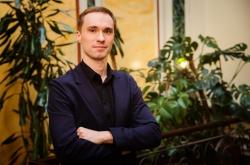The conference aimed to explore the development trends of photonic technologies in Russia, discuss key advances, prospects, and limitations, as well as explore market expansion strategies and collaborations between academia and industry (incl. joint research projects and implementation of new technologies). Among the participants were experts from Severgroup, Skoltech, St. Petersburg Electrotechnical University “LETI,” Moscow State University, Sberbank, Rostelecom, Zelenograd Nanotechnology Center, and other high-ranked companies and universities.
During the meeting, the speakers outlined several strategies that can help fuel the industry’s growth in Russia:
-
Development of software for photonic processors should be aligned to, or even preempt, that of hardware to prevent any delays;
-
Photonics experts in Russia need to focus on developing accelerators for AI tasks that will be in a slightly higher price range or more efficient than their counterparts;
-
Photonics research is vital, but the industry needs ready-made solutions. There is a shortage of domestic companies that can take research all the way to commercial solutions;
-
It is advisable to establish a consortium for the development of photonic technologies, which will bring together science and industry and include academic research and implementation stages.
Photonic computing is actively pursued all across the world. It is projected that by 2030, commercially-available photonic processors would handle the field’s problems 100-1,000 times quicker than contemporary electronic processors, which highlights the need for such developments in Russia.
The experts at ITMO’s Laboratory of Laser Systems are already testing a photonic processor that relies on neuromorphic computing – an approach to designing hardware and algorithms that is inspired by the human brain. The sample in question surpasses existing computing tools in terms of speed and affordability and has already been tested using corporate data.
“It’s hard – but equally crucial – to establish a constructive dialogue between science and industry. Thanks to Severgroup, a delegation of high-ranked professionals from high-tech businesses gathered here today. This relationship is of massive value and rather prestigious to us, as it’s our first time collaborating with Severgroup in photonics. Meanwhile, we already have plans for future projects: together, we intend to construct a prototype of a photonic processor to tackle Lenta's business tasks, namely revenue forecasting (Lenta is a major Russian supermarket chain – Ed.). Furthermore, ITMO plans to continue pursuing the field of photonic computing: in particular, by further exploring photonic reservoir computing, improving their architecture, and increasing the accuracy and speed of these devices so that they surpass classic silicon processors,” said Vladimir Vitkin, the head of ITMO’s Department for Development and Support of Government Information Systems.
As of now, the sample of a photonic processor is put to the test in forecasting time series at Lenta’s stores. As noted by Alexander Bubnov, the head of the center for innovation expertise at the Academy of Severgroup’s Business System, accurate forecasting can help reduce excess inventory at warehouses and improve the accuracy of automatic grocery orders. The first results are expected to demonstrate the advantages of using photonic computing for both this problem and for all discrete optimization problems in the industry.
“Photonic technologies are one of 16 priority technological trends for Severgroup. Photonic computing studies are carried out globally, and they hold significant potential for use in machine learning, AI, image processing, and other fields,” noted Aleksandr Kolobov, the head of Severgroup’s Business System.









